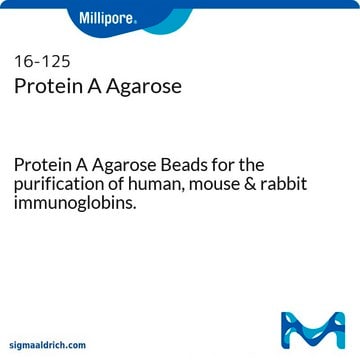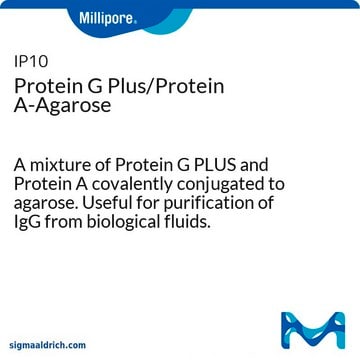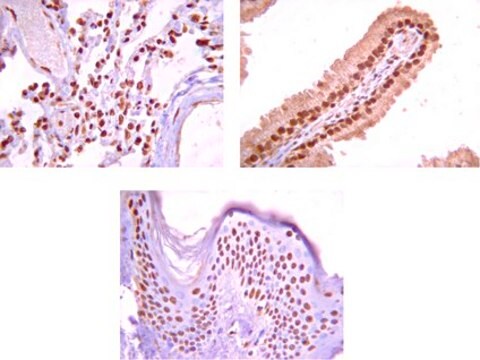16-266
Protein G-Agarose, Fast Flow
Protein G Agarose, Fast Flow suitable for medium and low pressure chromatography of IgG from mouse, sheep, and rabbit, and for immunoprecipitations.
Synonym(e):
Protein G resin
Anmeldenzur Ansicht organisationsspezifischer und vertraglich vereinbarter Preise
Alle Fotos(1)
About This Item
UNSPSC-Code:
41116133
eCl@ss:
32160801
NACRES:
NA.56
Empfohlene Produkte
Form
liquid
Hersteller/Markenname
Upstate®
Methode(n)
affinity chromatography: suitable
immunoprecipitation (IP): suitable
western blot: suitable
Versandbedingung
wet ice
Allgemeine Beschreibung
Fast-Flow-Agarose enthält hochgradig vernetzte Agarose-Beads oder -Gele, die verglichen mit Standard-Agarose-Bead-Harzen hohen Druck tolerieren kann. Darüber hinaus sind diese Harze ideal für Aufreinigungsverfahren mit schneller Proteinflüssigchromatographie (FPLC). Sie werden für Antikörper-Aufreinigungen im mittleren bis großen Maßstab bevorzugt. Dieses Produkt enthält Protein G, über eine Cyanogenbromid-Bindung kovalent an hochgradig vernetzte Agarose-Beads (4 % Agarose) gebunden. Es ist in allen wässrigen Puffern stabil, die in der Protein-G-Chromatographie verwendet werden.
Anwendung
Protein G-Agarose, Fast Flow wird in der Immunpräzipitation eingesetzt. Sie ist auch für die Mittel- und Niederdruckchromatographie von IgG von Maus, Schaf und Kaninchen geeignet.
Qualität
routinemäßig beurteilt mittels Immunpräzipitation und Aufreinigung
Physikalische Form
Wasser mit 20%igem Ethanol
Lagerung und Haltbarkeit
1 Jahr bei 4 °C
Rechtliche Hinweise
UPSTATE is a registered trademark of Merck KGaA, Darmstadt, Germany
Haftungsausschluss
Sofern in unserem Katalog oder anderen Begleitdokumenten unserer Produkte nicht anders angegeben, sind unsere Produkte nur für Forschungszwecke vorgesehen und nicht für andere Zwecke zu verwenden, einschließlich, jedoch nicht beschränkt auf unautorisierte kommerzielle Verwendung, zur In-vitro-Diagnostik, für Ex-vivo- oder In-vivo-Therapiezwecke oder jegliche Art der Einnahme oder Anwendung bei Menschen oder Tieren.
Signalwort
Warning
H-Sätze
Gefahreneinstufungen
Flam. Liq. 3
Lagerklassenschlüssel
3 - Flammable liquids
WGK
WGK 1
Flammpunkt (°F)
116.6 °F
Flammpunkt (°C)
47 °C
Analysenzertifikate (COA)
Suchen Sie nach Analysenzertifikate (COA), indem Sie die Lot-/Chargennummer des Produkts eingeben. Lot- und Chargennummern sind auf dem Produktetikett hinter den Wörtern ‘Lot’ oder ‘Batch’ (Lot oder Charge) zu finden.
Besitzen Sie dieses Produkt bereits?
In der Dokumentenbibliothek finden Sie die Dokumentation zu den Produkten, die Sie kürzlich erworben haben.
Kunden haben sich ebenfalls angesehen
Boshi Wang et al.
EBioMedicine, 41, 320-332 (2019-02-13)
Hyper-activation of TGF-β signaling is critically involved in progression of hepatocellular carcinoma (HCC). However, the events that contribute to the dysregulation of TGF-β pathway in HCC, especially at the post-translational level, are not well understood. Associations of deubiquitinase POH1 with
Carsten Juel
PloS one, 9(10), e110514-e110514 (2014-10-14)
Changes in ion distribution across skeletal muscle membranes during muscle activity affect excitability and may impair force development. These changes are counteracted by the Na,K-ATPase. Regulation of the Na,K-ATPase is therefore important for skeletal muscle function. The present study investigated
Jie Hu et al.
FEBS letters, 592(11), 1893-1904 (2018-05-22)
SAMHD1 inhibits Hepatitis B virus (HBV) replication by reducing the intracellular dNTP levels. However, how SAMHD1 phosphorylation is regulated to abrogate its restriction of HBV replication in hepatoma cells is poorly understood. Here, we show that HBV replication and SAMHD1
Carsten Juel et al.
Physiological reports, 3(8) (2015-08-25)
Potassium and sodium displacements across the skeletal muscle membrane during exercise may cause fatigue and are in part controlled by the Na,K-ATPase. Regulation of the Na,K-ATPase is therefore important for muscle functioning. We investigated the effect of oxidative stress (glutathionylation)
Lijing Liu et al.
The Plant journal : for cell and molecular biology, 61(5), 893-903 (2009-12-18)
The ubiquitination proteasome pathway has been demonstrated to regulate all plant developmental and signaling processes. E3 ligase/substrate-specific interactions and ubiquitination play important roles in this pathway. However, due to technical limitations only a few instances of E3 ligase-substrate binding and
Unser Team von Wissenschaftlern verfügt über Erfahrung in allen Forschungsbereichen einschließlich Life Science, Materialwissenschaften, chemischer Synthese, Chromatographie, Analytik und vielen mehr..
Setzen Sie sich mit dem technischen Dienst in Verbindung.









